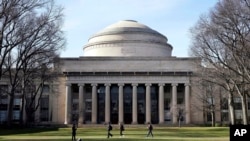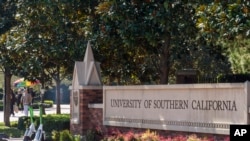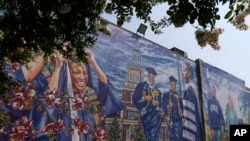Student Union
- By Tom Collier
A British Perspective: Is the American Democratic System All it's Cracked Up to Be?
I got to America just in time for campaign season to begin, and just in time to catch a moment that set the tone for the election as I have experienced it since.
When I arrived, Republican Senate candidate Todd Akin was just about to tell a TV station in Missouri that during “a legitimate rape, the female body has ways to try to shut that whole thing down,” arguing abortion shouldn't be allowed in cases of rape. I was shocked to hear a candidate say something that was not only scientifically untrue but also such a seemingly extreme point of view. In Britain, this comment would almost certainly have resulted in the candidate stepping down and the campaign of the party being seriously damaged.
While many Republicans did condemn Akin’s statement, and Akin eventually apologized, the outrage was hardly as universal and decisive as I would have expected back home. Akin is still campaigning to represent Missouri in the U.S. Senate, and even has a chance at winning, running in a state where nearly 40% of voters are evangelical Christians. In fact, the comments were treated as a political gaffe (albeit a major one); something for the Democratic party to seize upon as “worrisome” and “extreme” in arguing the case for their own party and candidates.
Divisions, Real and Contrived
As I've found, candidates can and do run on some very divisive issues, playing to the more extreme parts of their parties to solidify support from the “base.” Meanwhile, each party also goes after the middle ground, exploiting gaffes made by the competition in order to paint them as the immoderate ones.
In fact, the Republican National Convention was themed around a comment President Obama made during a campaign speech, in which he said, “If you’ve got a business – you didn’t build that.” The Republican convention trumpeted “We Built It” in response to what they hoped to suggest was Obama’s callous attitude towards private business owners and preference for government welfare programs.
It took me a while to understand why that comment was considered a gaffe actually, especially since in its full context it seems clear that's not what Obama intended. But one of the things I’ve learned in my American history class this semester is that this country has a proud ethic of individualism, and people believe that with hard work and determination they can achieve anything.
The Republicans evidently knew the comment could strike a sour note with many Americans, particularly the small business owners who are a key target for both parties, and played up its importance.
A Bitter Election
I gather from the Americans I have spoken to here that they view this as an incredibly important election in terms of the path America will take for its people and how it chooses to present itself in the eyes of the world. Perhaps as a result, they tell me this is one of the most bitterly divided campaigns they can remember in a long time – if ever.
Polling shows that if the rest of the world were voting for America’s president, we would choose Obama, and it’s difficult for us to understand how the election could be so close. As with the "you didn't build that" gaffe, there are many issues at play in the election that are uniquely American, not least of which is the political system itself. Their electoral process and governmental design contrive to split the population into two rival factions, each of which stays competitive (in voting power and in spirit) with the other.
In the U.K. we have a multi-party parliamentary system, so I’m used to people being able to vote with parties and politicians who represent many different points of view. Even though, realistically, only two of the parties have a chance of winning an outright majority, the smaller parties still maintain some influence and representation in parliament.
The two-party system, by contrast, seems to encourage more extreme partisanship - the varying opinion that everything is either great or terrible, positive or detrimental, patriotic or un-American. There is no nuance, and no real attempt to create it.
Inundated with Ads
It’s in the campaign advertising where you can really see the extent to which party divisions exist. Campaign ads have taken over television in the past few months, and it’s been impossible not to notice the bitterness and the drama.
One ad for Governor Romney stated, "Obama took GM and Chrysler into bankruptcy and sold Chrysler to Italians who are going to build Jeeps in China." An Obama ad countered, "He's [Romney's] still pushing tax breaks for companies that ship jobs overseas. It's just what you expect from a guy who had a Swiss Bank Account."
Many of the ads pounce on comments taken out of context, or cite their own facts that contradict with those cited by the other side.
This is something we simply don't have in Britain. When a judge upheld the U.K. ban on political advertising in 2008, he said that impartiality is “not achieved if political parties can buy unlimited opportunities to advertise in the most effective media, so that elections become little more than an auction.”
After two and a half months of being in the U.S., I have found myself becoming immune to the political ads I see. I often wonder how people can possibly be expected to make an informed decision based on these commercials, or why they even accept the repetition of political advertising as a logical use of resources.
Debates as Theater
After all this, I was very much looking forward to the presidential debates, which I hoped would shed a different light on the candidates and their positions (televised debates were introduced for the first time in the 2010 election in the U.K., so the idea of debates being an important part of the election process is still relatively novel).
But I was a bit disappointed. Like in the ads, I felt that both candidates made claims without any real fact-checking, making it difficult to compare their policies against each other.
The general consensus was that Romney won the first debate, seemingly based on his body language, confidence and assertiveness. Obama himself conceded that if you haven’t got the energy, then the points you make won’t be appreciated.
I think the debates should be about presenting the facts and the proposed policies, to provide the American people with a fair representation of what each candidate believes in or is proposing. It doesn’t feel to me like people have a lot of opportunity to judge either candidate on what they actually say or believe.
What's it All For?
Nor does it feel like anyone is decrying that fact. It seems Americans simply accept that this is how an election goes - campaign ads that say nothing or make bogus claims, debates that favor style over substance, cutthroat competition between two parties.
This makes me wonder – is it all worthwhile?
It’s a hard question to answer. Every democracy has its problems, including the British system. The simple fact of letting people choose their leaders means that politics sometimes devolves into bitterness and childish antics, and sometimes plays to the lowest common denominator.
This year in America feels particularly bad (not that I have a precedent to judge against), and the Americans I know seem to recognize that, without concluding that that means their system doesn’t work properly. I’m still not sure whether I reach the same conclusion, though I fully recognize that as an outsider here who doesn’t understand the American ethos I’m not entirely qualified to judge.
But it was a British politician, Winston Churchill, who might have had the answer when he said, “Democracy is the worst form of government, except for all those other forms that have been tried from time to time.”
See all News Updates of the Day
US remains top choice for Indian students going abroad
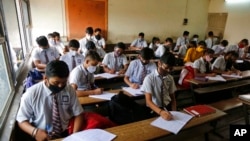
About 69% of Indian students traveling abroad for their studies chose the United States, according to a Oxford International’s Student Global Mobility Index. Other popular choices were the United Kingdom, Canada and Australia.
Education Times reports the main influencers for deciding where to study abroad – for Indian students and others – were parents. (April 2024)
Malaysian official: Schools can’t turn away from global tensions
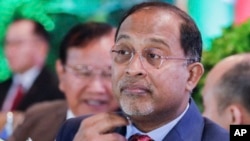
Zambry Abdul Kadir, Malaysia’s higher education minister, said protests spreading across universities in the United States show that schools can’t ignore political tensions.
Helen Packer, reporting in Times Higher Education, said the minister reminded educators that universities are key in the development of leaders, individuals and societies. (April 2024)
Social media breaks are difficult, but necessary

Between online classes, maintaining social connections and working on projects, college students can have a hard time disengaging from the demands of technology.
In Florida International University’s PantherNOW, Ariana Rodriguez offers strategies for taking a break from social media. (April 2024)
- By Melos Ambaye
Many master's degrees aren't worth the investment, research shows
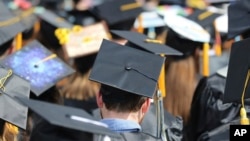
Nearly half of master's degrees have a negative financial return, according to new research by the Foundation for Research on Equal Opportunity, an economic research organization.
The study indicates that many graduate degree programs do not increase lifetime earnings enough to be worth it.
While 23% of bachelor’s degree programs yield a negative financial return on investment, 43% of two-year degrees and master’s degrees fail to deliver a return, according to the study by Preston Cooper, a senior fellow at FREOPP.
Cooper assessed the return on investment for 53,000 degree and certificate programs to determine whether a student’s lifetime earnings outweigh program costs and the risk of not completing their degree.
His findings show that a student’s field of study was the overriding indicator of return on investment at the undergraduate and graduate level.
Engineering, computer science and nursing bachelor’s degrees have high financial returns on investment, while programs in education, fine arts, psychology and English usually have low returns.
Graduate degrees in medicine and law tend to have strong payoffs. But a large share of master’s programs, including the MBA, frequently have low payoffs, according to Cooper.
Although workers with master’s degrees earn 16% more than those with only bachelor’s degrees, Cooper says the figure fails to account for students who had “higher preexisting earnings potential.”
“MBA students typically have high preexisting earnings potential, having often chosen high-ROI undergraduate majors such as finance and economics,” Cooper writes. “So the MBA adds little value on top of that.”
The study indicates that high starting salaries are predictors of high returns on investment. Degrees with starting salaries of $57,000 a year or more deliver the best lifetime returns.
But the return on investment of a degree can vary depending on the educational institution.
“Students interested in fields with low average pay can still find some schools that do well transforming those fields of study into high-paying careers,” Cooper writes.
The quality of an institution also matters, said William Tierney, professor emeritus of higher education at the University of Southern California.
“An MBA from Harvard is a likely ticket to a good job,” Tierney told VOA. “An MBA from the University of Phoenix, less so.”
But students pursue graduate programs for more than just financial reasons.
“Some degrees open up careers in fields that students may enjoy, such as in the performing arts,” Robert Kelchen, head of educational leadership at the University of Tennessee, Knoxville, told VOA.
“Others can help gain access to social networks or simply help students learn about a topic that is of interest,” Kelchen added.
Cooper told VOA that it might make sense for students in degree programs with low returns on investment to switch majors if they can still graduate on time.
He found the worst outcome for a student’s return on investment is dropping out of college “because they must pay for one or more years’ tuition and spend time out of the labor force.”
Lawmakers who fund higher education have a responsibility in ensuring “higher education delivers on its promise of economic mobility,” Cooper said.
Nearly a third of federal funding, including Pell grants and student loans, pays for higher education programs that fail to provide students with a return on investment, according to the study.
Cooper’s view is that “some schools should shut down low-ROI programs and reallocate institutional resources to programs with a better return.”
“There's definitely this narrative out there that higher education is always worth it, and you should always try to get that extra degree because it will increase your earnings,” he told VOA. “That's reinforced by colleges who make lofty promises regarding their graduate degree programs' outcomes, which all too often fall short.”
Harvard students end protest as school agrees to discuss Gaza conflict
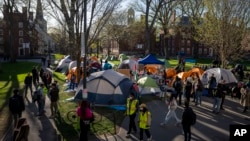
Protesters against the war between Israel and Hamas were voluntarily taking down their tents in Harvard Yard on Tuesday after university officials agreed to discuss their questions about the endowment, bringing a peaceful end to the kinds of demonstrations that were broken up by police on other campuses.
The student protest group Harvard Out of Occupied Palestine said in a statement that the encampment "outlasted its utility with respect to our demands." Meanwhile, Harvard University interim President Alan Garber agreed to pursue a meeting between protesters and university officials regarding the students' questions.
Students at many college campuses this spring set up similar encampments, calling for their schools to cut ties with Israel and businesses that support it.
The Israel-Hamas war began when Hamas and other militants stormed into southern Israel on October 7, killing some 1,200 people and taking 250 hostages. Palestinian militants still hold about 100 captives, and Israel's military has killed more than 35,000 people in Gaza, according to Gaza's Health Ministry, which doesn't distinguish between civilians and combatants.
Harvard said its president and the dean of the Faculty of Arts and Sciences, Hopi Hoekstra, will meet with the protesters to discuss the conflict in the Middle East.
The protesters said they worked out an agreement to meet with university officials, including the Harvard Management Company, which oversees the world's largest academic endowment, valued at about $50 billion.
The protesters' statement said the students will set an agenda that includes discussions on disclosure, divestment, reinvestment and the creation of a Center for Palestine Studies. The students also said that Harvard has offered to retract suspensions of more than 20 students and student workers and back down on disciplinary measures faced by 60 more.
"Since its establishment three weeks ago, the encampment has both broadened and deepened Palestine solidarity organizing on campus," a spokesperson for the protesters said. "It has moved the needle on disclosure and divestment at Harvard."





